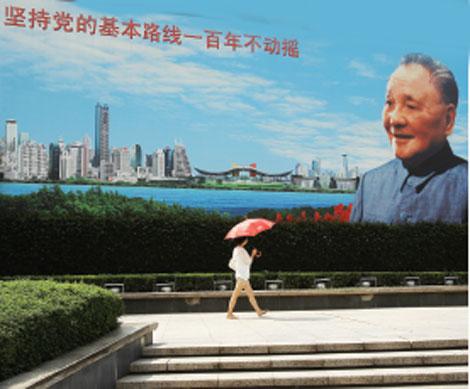
 |
|
The portrait of Deng Xiaoping in downtown Shenzhen is the city's landmark. Deng was recognized as "the father of Shenzhen" as he proposed to make Shenzhen a "special economic zone", and ever since the city had been experiencing significant economic growth and greater economic integration with neighboring Hong Kong. [Photo/China Daily] |
For example, waiting to make an order in line at McDonald's cashier is a common practice in Hong Kong. It's not quite the same in Shenzhen.
"Very often I would go into a McDonald's and would find people standing randomly. I would not have any idea of how long I might be kept waiting, since there was no queue at all," said Poon.
"Another small thing is that people here don't obey traffic lights, both for driving and walking. You have to be cautious even when you're walking when a green light is on, since there might be cars going through red lights," said Poon.
Poon's job with FTU Shenzhen center was to facilitate the needs of Hong Kong residents in Shenzhen. Education, medical service and food safety were major issues that Hong Kong residents were concerned when living on the mainland.
"Medical service is more expensive on the mainland since we don't have medical insurance here, however, money wasn't the only concern. The medical practice in Shenzhen was so different. People conduct infusion very often, while it is only done in cases of serious illness requires infusion in Hong Kong," said Poon.
Nowadays, most people received at the FTU Shenzhen centre are the elderly and cross-boundary students. Most difficulties are encountered by the elderly who moved to Shenzhen to retire.
"Recently, there was a trend among elderly who wanted to move back to Hong Kong because the high inflation in Shenzhen and the depreciation of the Hong Kong dollar made retirement in Shenzhen no longer affordable," said Poon.
Economic pressure has forced some Hong Kong residents to move back home, since the special economic zone's growing economic development removed many of its cost of living advantages.
Some have found attractive opportunities in Shenzhen and choose to lead what to them is a better life, away from the fierce economic competition in Hong Kong.
Wong Ching-hung, a Hong Kong teacher who moved to Shenzhen a decade ago to carry on property investing, was inspired by another business opportunity — the cross boundary school bus.
"I myself have two kids attending schools on the other side of the border. It was the idea of arranging a nanny bus for my younger son that inspired me to start the business," Wong recalled.
As a daughter of a Fujian family and married to a Hong Kong man, Wong had a mixed background; as a Hong Kong teacher and a mother of two living in Shenzhen, she knew exactly what the teachers and parents needed, as an "insider".
"Thus I started the cross-boundary business as one of the pioneers in the industry. I opened the first nanny bus company in Futian Port and I'm glad to see the industry growing bigger and bigger now," said Wong. She founded the Wong Ching-hung Cross-boundary School Bus Company and was also the president of the Association of Parents of Shenzhen-Hong Kong Cross-boundary Students.
"The two cities have experienced greater integration in recent years. They have more and more in common," said Wong.
"However, I urge Hong Kong to give more understanding to cross-boundary students and further facilitate their way to and from school," said Wong.
"We've seen people criticizing the students for taking up too much space on public transportation; we've been accused of not taking good care of the students on the way," said Wong.
In fact, the governments on both sides were working together to provide better education to Hong Kong students in Shenzhen. They've reached initial consensus to build the Lok Ma Chau Loop, commencing operation of part of the higher education facilities promised by 2020. "I don't really fancy the idea of starting such a loop, if eventually Hong Kong laws, Hong Kong education resources are applied in the loop, why don't we just facilitate the students' way to Hong Kong and save all the energy to make one community out of the blues," said Poon.
Tong's wife will become a permanent Hong Kong resident, yet the couple has no plans to leave Shenzhen.
"We believe with greater integration between the two metropolises, life in Shenzhen will be more convenient. We treat both cities as our hometown," said Tong.
Special Coverage: Hong Kong handover 15th anniversary